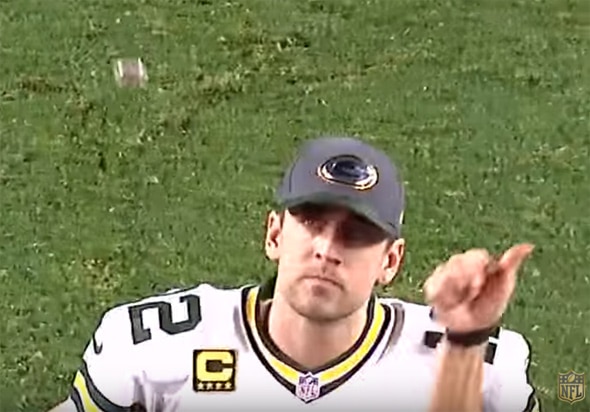Create a free profile to get unlimited access to exclusive videos, sweepstakes, and more!
A Game Is Lost on the Torque and Parabola of an Isotropic Disk

Over the weekend, the Green Bay Packers lost in a heartbreaking overtime (American) football game to the Arizona Cardinals. In a game filled with a lot of odd events (a Hail Mary pass to the end zone that led to a tie-making point with literally zero seconds left on the clock?!), both teams were so evenly matched that whoever won would be, really, a coin toss.
Literally.
In the NFL, if two teams are tied at the end of the regulation game, they go into overtime. A ceremonial coin is flipped, and one team picks heads or tails. If they win, they get to choose either to kick or receive the ball, or which goal they wish to defend at the start of overtime.
At the end of the regulation game, the ref flipped the coin. Aaron Rodgers, of the Packers, called “tails.” This is when things got weird: The coin didn’t flip end-over-end. Instead of tumbling, it went up and down flat, parallel to the ground, landing on heads. Watch this video, especially the last ten seconds or so for a close-up.
Odd, eh? The ref immediately picked the coin up, said it didn’t actually flip, and tossed it up again. It again came down heads, and the Packers lost the toss. Because of this, the Cardinals got the choice, opted to receive, and seconds later ran the ball into the end zone for a touchdown, winning the game.
At this point, of course, there were complaints. Was the toss fair? Could the coin have been weighted? A Packers linebacker said, "… there was a little protective case that might have been weighted in the heads [sic] favor."
It’s possible, but I doubt it would have made a difference. The coin is heavy, so a bit of plastic on one side seems like it wouldn’t do much. I don’t see how that would’ve prevented it from tumbling end-over-end anyway; it tumbled fine in the second toss. Plus, landing twice on heads in a row is a 1 in 4 chance, not unlikely. And Aaron Rodgers, who called the toss for the Packers, had the freedom of choice to pick heads or tails. So it’s unlikely collusion or cheating was involved.
So why didn’t the coin tumble? I can think of a reason: physics, in the form of torque. Or the lack thereof.
Torque is a force applied to an object that doesn’t go through its center of mass. This imparts a rotational force on the object, generally resulting in a spin. In a coin toss, the upward motion comes mostly from the ref’s arm, throwing the coin up. But the ref also flicks their thumb on the edge of the coin, which imparts a torque, forcing the coin to flip end-over-end.
If the ref’s thumb were too far forward, under the coin’s center of mass, then the flick would not impart a torque, so the coin would just stay flat as it moved up and then back down to the ground.
Is this what happened? Theoretical physics is fine, but nothing beats an experiment. I happen to have a medallion that’s solid metal, so I tried flipping it a few dozen times. I have to admit that I was never able to replicate the completely flat nonflipping motion of the coin in the video. It seems to me, therefore, it’s unlikely the ref could’ve placed his thumb so perfectly by accident.
I wondered for a moment if perhaps the thumb flick would’ve made the coin spin, like a top. This would give the coin gyroscopic motion, which would help it stay flat as it moved through the air. This is (ironically) the same idea that keeps a football oriented correctly when it's thrown; if it spins rapidly, the axis of rotation (through the long axis of the ball) points along the trajectory, and the ball doesn’t flip end-over-end.
But it seems impossible to flip a coin that way. It would have to spin rapidly, and a thumb flick wouldn’t do that.
So what happened? Well, I have a thought on that, and it’s way simpler than you might think. I’ve watched the video a few times, and while it’s not conclusive, here’s what I think happened: The ref threw the coin up, but it left his hand before his thumb could impart rotation! He flicked his thumb, but too late; he missed. The coin only had the upward force his arm, and without the thumb flick it didn’t tumble.
And for want of a torque a kingdom was lost.
Science! It’s everywhere. Even—really, especially—in sports.


























